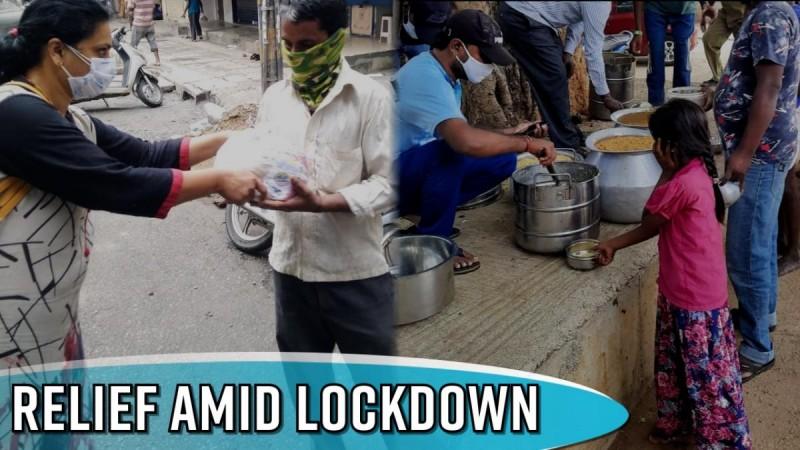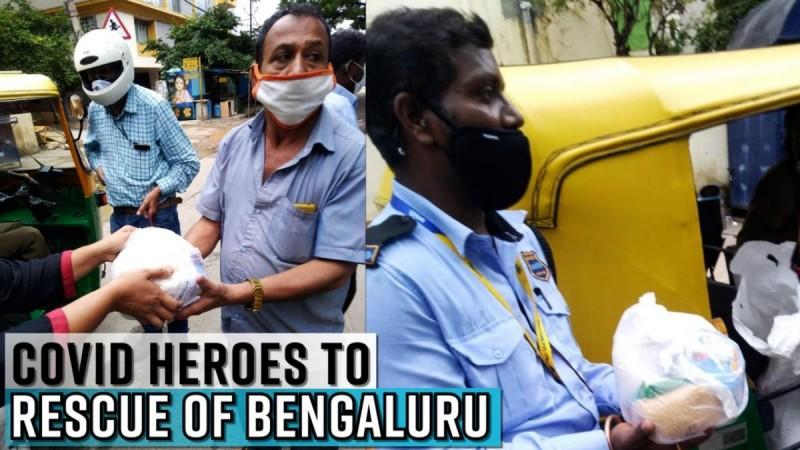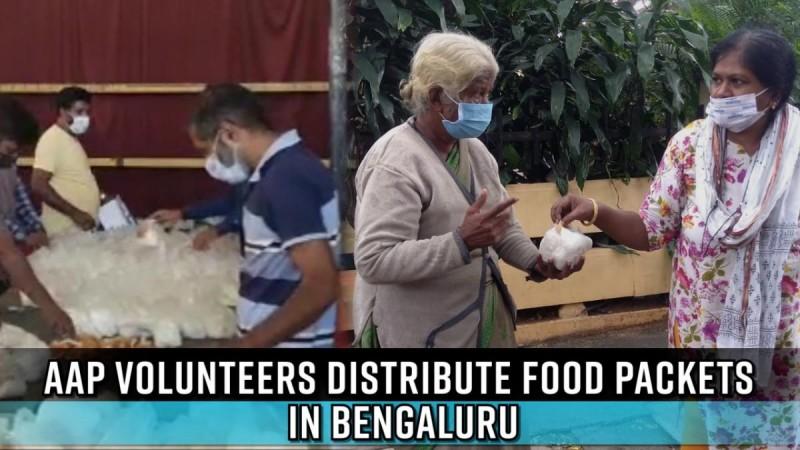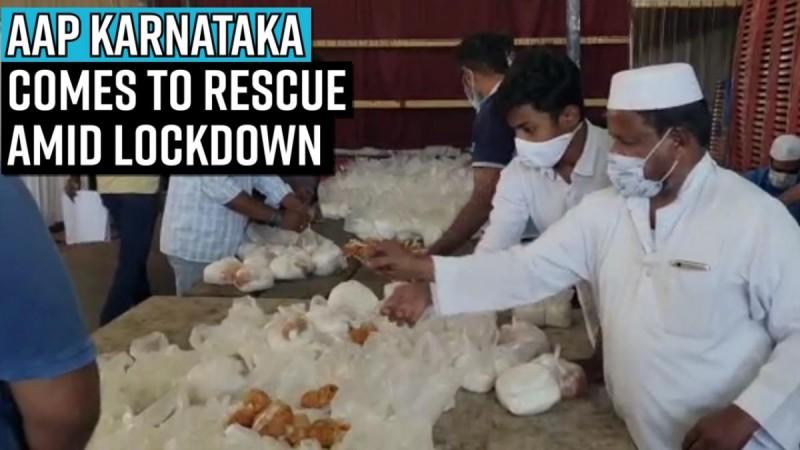COVID-19 pandemic, which started last year, continues to wreck the lives of millions. As the second wave of the virus hit India, millions are suffering. The crippled healthcare, financial instability and trying to manage basic needs, all of which have taken a heavy toll on people. In the southern state of Karnataka, which has a population north of 6.41 crore, and its biggest city Bengaluru, the COVID-induced lockdown has made it no less than a challenge to get by. Fending for oneself, be it poor or otherwise, has only gotten tougher.
In these challenging times, people are struggling to get their basic needs fulfilled. While the state government has made arrangements to provide meals thrice a day for the destitute, the masses still go hungry. The Indira Canteens available in every ward in Bengaluru haven't just been enough to feed the mouths of millions. This is the aftermath of a deadly pandemic, which appears far from over, and it has given rise to many COVID heroes, who have gone out of their way to help in any way they can.
The ground reality of people suffering as a result of the lockdown is entirely different from data points in a report. Imposing a lockdown without aid package that reaches the masses with effective grassroot-level execution so no one goes hungry, is the need of the hour. But many people still continue to suffer, if not by the virus, then hunger.

Karnataka government's decision to impose and then the lockdown is indeed the effective way to break the chain of COVID spread. The numbers show that. New COVID cases are dropping, hospital beds are not as difficult to find as they were before the lockdown, recoveries have spiked. But there's no check on people who have no way to fend for themselves. Daily wagers and people who rely on timely revenue have been hit by the lockdown and a lack of any relief measures have just added to their agony.
Volunteers step up to help
Seeing people's sufferings, a lot of volunteers, belonging to NGOs and activist groups, have stepped up to offer as much help as they can. From distributing food packets, rations, to consumables and essential items, we've seen how some good samaritans have gone out of their way to give back to society.
International Business Times spoke to some volunteers who have taken it upon themselves to provide cooked meals to people who haven't been able to feed their families due to the lockdown. Many volunteers shared similar concerns about the quantity of food available in Indira Canteens being nearly not enough to feed the masses. Due to this, stepping in to help the needy became essential.

Suhasini S of AAP Karnataka, who has been distributing food packets, snacks and face masks to the poor, expressed deep concerns regarding the ground situation in Yelahanka based on her experience. She has been distributing food packets thrice a day in her own vehicle, giving away biscuit packets in the evenings to kids on roadside and slum areas, and giving face masks during the lockdown.
I have distributed 1,500 face masks till now and I also try to educate people on the importance of social distancing because it is just as important. Seeing the plight of the people in my area, I took upon myself to distribute cooked meals to the people in need and I use my own vehicle for the same. The situation on the ground is really depressing and there should be some kind of relief for the destitute across the city," Suhasini tells IBTimes.
Many volunteers from AAP Karnataka shared their experiences of how people wait for them to distribute food packets every day. By distributing 10,000 food packets on a daily basis, these volunteers are helping as many people as they can in Bengaluru amid lockdown. While many are poor and depend on their daily income, some people who are otherwise financially stable are also reaching out for essentials.
We have seen a lot of people have lost their daily income during the lockdown. For them to even come out in the first half of the day to make some earning is quite difficult. Seeing this, we started distributing around cooked meals in different parts of the Bengaluru south assembly. We had to scale up the number of food packets distributed every day seeing as many people were in need," Sharat Khadri, Chief Spokesperson, AAP Karnataka and President of Bengaluru South Assembly, told IBTimes.
Khadri also noted that they run out of food packets in a matter of just 1-2 hours, which shows people are desperately in need of aid.

"It's not only the destitute and poor suffering from this, but also some people who had good earnings before the lockdown. They are generally not the people who will come out and ask for food. This is a very critical situation. This is why our volunteers proactively go and talk to people and ask them if they had breakfast or any meal and offer them food if they haven't," Khadri added.
AAP workers in Bengaluru have been noticing a similar trend across the city and stepping up to help the needy however possible.
We are giving food packets directly to houses, road by road. We are distributing around 1,000 packets every day. Since we are from a social worker group, we keep close tabs on people's needs and give them help even they are unable to ask for it," Mohammed Asad, AAP Organisational Secretary, Bengaluru, told IBTimes. "People who drive auto rickshaws, run small shops are in need of our help and there are some areas where people are really poor, so our volunteers go there and distribute food packets regularly."
Sharing an experience on how AAP Karnataka started its voluntary service of distributing food packets, Prithvi Reddy, AAP Karnataka Convenor, told International Business Times:
Before the previous lockdown, there were restrictions and weekend curfew. During that time, I was out to get a food parcel when I noticed an elderly lady was pacing and arguing at the nearby Indira Canteen. When I went there to see what was going on, I found out that she was pleading for a meal and promising to pay for it in a few days. I heard the woman say she's a beggar and there's no one on the roads and she hadn't eaten breakfast and it was already afternoon. It was very sad that someone had gone hungry for the sake of Rs 5. So we started distributing Indira Canteen coupons to whoever needed it. We did this for about a week, and later the meals were made free in Indira Canteens. But unfortunately, when the second lockdown was announced, all the public transport was shut. For a person to access this food, they had to walk a long distance. Our suggestions to the state government, the CM and the Indira Canteen to deliver the food to people did not see the light of the day. So we started distributing food packets and have been doing it for the last 14 days."
AAP Karnataka has also been distributing face masks, providing help to people in home isolation through their helpline. From oximeters, to cooked meals and even oxygen concentrators, AAP Karnataka has been providing any help possible in these challenging times.
"While we are doing all this, we think the need is definitely food. There was a time when medical infra was so bad, everyone concentrated on it... When the lockdown extension was announced, we saw change in people's behaviour as they grow desperate. Earlier they would patiently wait while the food was distributed, but now they appear desperate. Last year, a lot of did food and rations, but this year is not the same," Reddy added.

State must act
The state government's relief measures have only gone so far. People in low-income professions were promised anywhere from Rs 2,000 to Rs 3,000, but it hasn't been enough to survive through the second lockdown. In order to help the needy, the government must ensure effective grassroot execution of its relief measures and maintain checks on if the masses are getting their basic needs met.
There are a lot of government schools, BBMP parks. If they can utilise them to cook and distribute food on a larger scale, it can be helpful. Even though they have Indira Canteen, the quality and quantity of the food given there is concerning. If the government can scale up the quantity and assign a specific time, people won't rush thinking they will still get the food no matter the queue," Khadri said.
"Indira Canteen is only giving three food packets per person, so what happens if there are more family members in the family," questioned Asad.

Unfortunately, Khadri also shared an observation wherein people going to the Indira Canteens are not treated with respect, which pushes people away.
"I have noticed a Marshall is also deputed outside these Indira Canteens, who doesn't behave in the best of the way. Due to this, people feel ashamed coming to the Indira Canteens to ask for food. The government should really instruct its officials to act with empathy in such times," Khadri said.
The government should be doing these activities instead of volunteers or NGOs having to step in.
The COVID may come under control, but people are going to die of hunger," Reddy warns.















